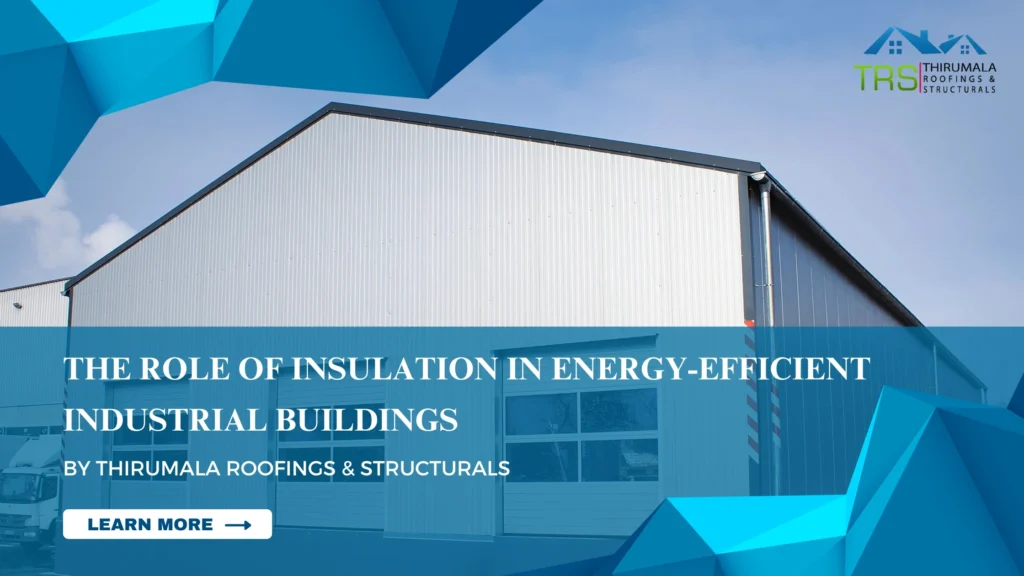The Role of Insulation in Energy-Efficient Industrial Buildings
As industrial operations continue to expand, the need for energy-efficient infrastructure becomes increasingly important. Insulation is one of the most important elements among the many that go into sustainable building. It plays a significant role in conserving energy, regulating internal temperatures, and optimizing overall building performance. Without proper insulation, energy waste can soar, driving up costs and environmental impact.
At Thirumala Roofings & Structurals, we specialize in offering tailored insulation solutions designed for diverse industrial needs. Our focus is not just on materials, but on delivering long-term value through enhanced energy efficiency.
Why Insulation Matters in Industrial Buildings
By acting as a thermal barrier, insulation reduces the rate at which heat moves from indoor to outdoor spaces. For industries involved in storage, manufacturing, or sensitive production processes, consistent indoor temperatures are critical.
Benefits of using quality insulation:
- Energy Efficiency: Helps reduce power usage by decreasing the load on HVAC systems.
- Cost Effectiveness: Lower electricity bills translate to significant savings over time.
- Comfort and Safety: Maintains a stable environment for both employees and equipment.
- Moisture Control: Prevents humidity build-up that could damage structures or products.
- Eco-Friendly: Reduces emissions by minimizing dependence on mechanical heating and cooling.
Common Industrial Insulation Materials
1. PUF (Polyurethane Foam) Panels
PUF panels’ superior heat resistance makes them popular. They are durable, light, and highly efficient in maintaining interior temperatures.
Explore our specialized PUF Panel Installation Services, ideal for cold storages, food processing units, and temperature-controlled environments.
2. Mineral Wool Insulation
Made from volcanic rock or industrial slag, mineral wool offers high resistance to fire, sound, and heat. It’s a preferred material where safety and acoustic insulation are priorities.
3. EPS (Expanded Polystyrene) Panels
These lightweight panels offer decent thermal insulation at an economical price. They are particularly useful for prefab structures requiring quick and cost-effective installation.
4. Glass Wool
Glass wool, which is composed of fine glass fibers, provides good acoustic and thermal insulation. It is resistant to fire and moisture, making it suitable for ductwork and ceiling cavities.
Where Insulation Adds Value
- Walls and Roofs: Prevents heat loss or gain, improving energy retention.
- Temperature-Controlled Storage: Essential for cold storage units and freezers.
- Manufacturing Areas: Protects sensitive machinery from overheating.
- Pharmaceutical & Clean Rooms: Maintains regulated climates to meet strict industry standards.
- Logistics Warehouses: Preserves the integrity of stored goods while improving worker comfort.
Energy Efficiency Gains Through Proper Insulation
Insulation does more than retain temperature; it ensures energy systems function at optimal efficiency. A well-insulated facility creates a ‘thermal envelope’ that significantly reduces leakage of conditioned air.
Performance Factors:
- High R-Values: Indicates better insulation performance and thermal resistance.
- Tight Sealing: Minimizes air infiltration, preserving internal climate control.
- Humidity Resistance: Prevents mold, corrosion, and structural deterioration.
- Improved Lifecycle Performance: Reduces strain on HVAC systems, extending their operational life.
Why Choose Thirumala Roofings & Structurals
With a reputation for quality and innovation, Thirumala Roofings provides end-to-end insulation services that align with the energy efficiency goals of modern industry.
- Customized Guidance: We evaluate every project separately in order to suggest the best kind of insulation.
- Premium Products: We source certified, long-lasting materials built for industrial rigor.
- Flawless Execution: Our experienced teams ensure each installation meets top engineering standards.
- Integrated Solutions: Our insulation is seamlessly built into Pre-Engineered Buildings and modular prefab systems.
Whether it’s a new build or a retrofit, our expertise delivers measurable savings and operational reliability.
Long-Term Advantages of Industrial Insulation
- Reduced Utility Costs: Enjoy lower monthly bills from optimized energy usage.
- Extended Equipment Lifespan: HVAC and cooling units operate more efficiently.
- Employee Well-being: Stable indoor temperatures improve working conditions.
- Compliance Ready: Meets environmental regulations and safety codes.
- High Asset Value: Energy-conscious buildings offer better ROI and resale value.
Conclusion
Insulation is a strategic investment in energy management for industrial buildings. It’s not merely a technical feature—it’s a fundamental contributor to sustainable operations. As industries evolve, integrating advanced insulation solutions is vital to staying competitive and compliant.
During this transition, Thirumala Roofings & Structurals is your reliable partner. Our comprehensive insulation offerings are designed to boost energy performance while minimizing operational risk.
Let’s build smarter, greener spaces—together. Reach out to us through our contact page to learn how our insulation solutions can benefit your facility.

